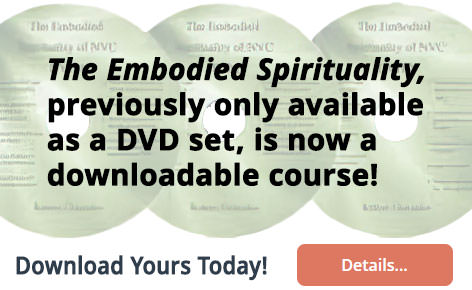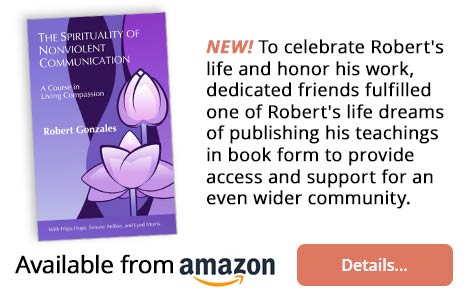

Welcome to the Robert Gonzales Training Legacy. Here you can learn more about Robert and the powerful teachings he dedicated his life to. NVC Academy is proud to house and share with you the complete body of his life's work. We invite you to explore, learn, and help keep his legacy alive!
Robert's passion was in the spirituality of the Nonviolent Communication (NVC) process. He saw NVC both as a process that helps people connect more authentically with themselves and others, and as a spiritual practice and way of living. The worldwide NVC community mourned when Robert died in 2021. He left behind a legacy of work that emerged from a lifetime of inquiry into the intersection between spirituality and human communication. More about Robert.
Video
6 minutes
Have you ever said 'I'm Sorry' to someone, only for it to leave you feeling disappointed and lacking connection? In some cultures, saying 'I'm sorry' has become too easy and is used for all sorts of situations. Whether it's just to excuse yourself as you pass in front of someone taking a photo, or if you've truly hurt a close friend. So when we really need to communicate regret, how can we do so in a way that acknowledges the situation and the connection?
Details...Practice Exercise
4 - 6 minutes
One way of simplifying decision-making in relationships is clarity about the level of contact and connection you want with the people you interact with. This means knowing what you want and don’t want to share, the kinds of activities you do and don’t do together, how often, etc. This can help you chose how to best support your needs in that context, and help you to remember to set life-serving boundaries when you need them.
Details...Join CNVC Certified Trainer Jerry Koch-Gonzalez, Greg Rouillard and Certified Dynamic Governance (Sociocracy) Consultant John Buck for this six-session course recording to learn how to transform your method of meeting facilitation. Many NVC organizations have begun using sociocratic tools, including circle meetings and decision making by consent, with satisfying results.
Details...Trainer Tip
1 - 2 minutes
Trainer Tip: One of the swiftest ways to close our hearts is having judgmental thinking or looking to get our way. How open are you when you’re in this mode? The goal in peaceful living is to approach our relationships with an open heart. Start conversations today with an intention to connect with other people.
Details...Trainer Tip
1-2 minutes
Our craving for love, acceptance, and approval can lead us to show only parts of ourselves and hide others. This lack of authenticity breeds disconnection and mistrust, leading to those very needs not being met. Once I accept myself, being authentic is easier. And then people in my life can love me for who I really am, warts and all.
Details...Practice Exercise
7 - 10 minutes
Reactivity can harm relationships, but there are three keys to prevent or dissolve reactivity: discernment (recognize reactivity and interrupting it), transparency (express feelings and wants honestly and making simple requests), support for conscious connection (remind ourselves to practice prioritizing connection in interactions). Practice these to maintain fulfilling relationships and reduce impacts caused by reactivity.
Details...Audio
8 - 10 hours
If you are tired of feeling dissatisfied, frustrated and hopeless about experiencing ease and joy in your intimate relationships, this course is for you! Please join CNVC Certified Trainer and long-time relationship expert, Kelly Bryson, in this course to rethink and relive your perception of love so you can actually feel love, let love in and be love.
Details...Trainer Tip
1 - 2 minutes
Trainer Tip: Whether we listen to our own or the other person’s needs first, connecting to needs can help us release judgments of others, see their humanness, help us to begin to hear them and ultimately connect to them. Be aware today of times when you are judging someone. Then be aware of your own needs to improve your connection to them.
Details...Trainer Tip
1 - 2 minutes
Trainer Tip: Thinking someone is bad, wrong, or evil can make it more difficult to connect with them. If we focus on this kind of thinking, we stay in the problem or conflict. The minute we step out of judgement and listen for the needs underlying their actions, we begin working for the solution. Put your focus in the direction of the result you want. Read on for an example.
Details...Learning Tool
1-2 minutes
This one page colour handout illustrates the focus options or intention options for connection: empathy (verbal and non-verbal), self expression, and self connection (opening our heart to self and/or others). It also offers some suggestions for how to say these things to self and others.
Details...

